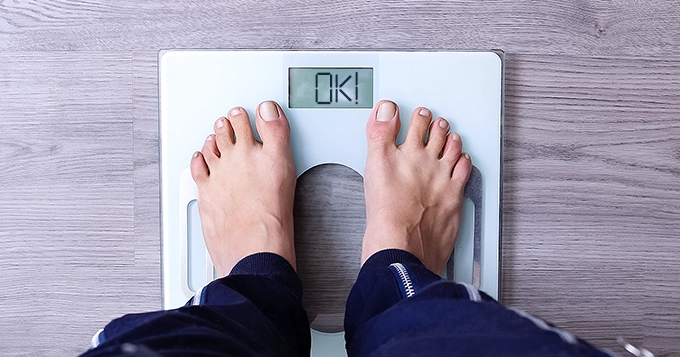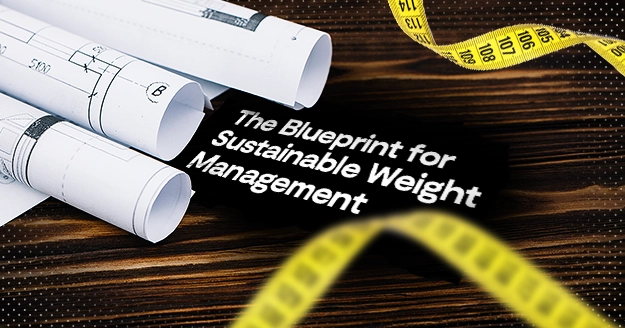With so many quick-fix solutions and fad diets flooding the market, it’s easy to get lost in a myriad of misinformation. However, sustainable weight management is not about following the latest trends but about adopting healthy habits you can maintain for life. This article will explore the blueprint for sustainable weight management, focusing on science-backed strategies that promote long-term success.
What is Weight Management?
For many individuals, the concept of managing weight, determining what constitutes a healthy weight, and figuring out the best steps to prioritize their health and well-being is often confusing. This confusion can stem from various factors, including conflicting information on key issues related to weight management, which can leave people uncertain about the most effective approach.
The term ” healthy weight management” typically refers to the process of making long-term lifestyle changes aimed at maintaining a healthy body weight.
Maintaining a healthy weight is crucial for controlling cholesterol levels, blood pressure, and blood sugar. It also serves as a preventive measure against weight-related diseases such as heart complications, arthritis, diabetes, and certain types of cancer.
What is sustainable weight loss?
Sustainable weight loss means steadily losing weight through healthy habits that you can keep up long-term. This includes realistic changes to your diet, exercise, and lifestyle that promote lasting results. This strategy avoids extreme dieting and quick fixes, focusing instead on lasting health benefits and well-being.
But know that sustainable management isn’t all about sustainable weight loss. It can also be used by people trying to gain weight.
Here are some things to remember to manage your weight sustainably.
Blueprint for Sustainable Weight Management
-
Nutrient Density
Regarding sustainable weight management, the quality of the food you consume is paramount. Opting for nutrient-dense whole foods ensures your body receives the necessary nutrients to function optimally. These foods include lean proteins, whole grains, healthy fats, fruits, and veggies.
Drastically cutting calories is not a good diet for sustainable weight loss. Once you achieve your target weight, you’re more likely to experience cravings and revert to old habits.
It’s more effective to begin with a modest daily calorie deficit that you can realistically maintain. This approach may result in slower weight loss, but it sets the stage for a smoother transition to lose weight sustainably.
Incorporating protein in your meals is also crucial in weight loss, bulking up, and maintenance. A protein-rich diet helps you feel full and satisfied, reducing hunger and cravings. his makes it easier to stay within your calorie goals and lose weight. If you’re trying to bulk up, protein can help you build and preserve muscle mass.
-
Slowly Adopt New, Healthy Habits
Jumping on the latest diet craze or resorting to restrictive methods for weight loss sets you up for failure down the road.
Sustainable weight management involves committing to healthy lifestyle changes that can be maintained for the long term. Instead of focusing on short-term fixes, adopt habits that promote overall health and well-being. These may include prioritizing regular physical activity, managing stress effectively, eating a balanced diet rich in whole foods, and getting enough sleep.
However, transitioning to a healthier lifestyle is a gradual process that requires patience and persistence. Instead of attempting drastic changes immediately, focus on incorporating small, manageable habits into your everyday routine.
For example, start by adding an extra serving of green veggies to your meals, replacing sugary beverages with water, or increasing daily exercise by just 10 minutes. The most effective habits are those that feel manageable and don’t require a complete overhaul of your lifestyle.
Trying to completely overhaul your diet overnight often leads to burnout. Instead, focus on making gradual changes, whether it’s to a single meal or a specific nutrient, so that the adjustments feel achievable and sustainable. Over time, these minor adjustments can add up to significant improvements in your overall health and well-being. When you take your time to change your habits, you’re more likely to see lasting results.
-
Create a Positive Relationship Between Your Body and Food
Developing a positive relationship with food is essential for sustainable weight management and overall well-being. Instead of viewing food as the enemy or attaching moral judgments to eating, strive to cultivate a healthy attitude towards nourishment.
Concentrate on nourishing your body with foods packed with nutrients to fuel its energy needs and support its vitality. Practice mindful eating by tuning in to your body’s hunger and fullness signals, and take pleasure in every mouthful. Avoid restrictive dieting and instead aim for balance and moderation in your food choices.
-
Let Your Diet Evolve With You
As you progress on your journey to better health, it’s essential to allow your dietary choices to evolve alongside your changing needs and preferences.
Just because you’re making lifestyle changes doesn’t mean food should feel like a chore. You can still enjoy nourishing your body with foods you love that also make you feel good—what matters most is finding a balance with your calorie intake and ensuring you’re getting enough protein.
Your nutritional requirements may vary depending on factors such as age, activity level, and overall health status. Experiment with different kinds of recipes and foods to discover what works best for your body and schedule. Be open to trying new foods and incorporating a variety of nutrient-dense options into your diet.
-
Metabolic Health
Maintain a balanced metabolism through consistent, balanced meals to prevent the body from entering a state of conservation.
Maintaining a healthy metabolism is essential for sustainable weight management. Eating balanced meals regularly helps keep your metabolism revved up, preventing it from slowing down in response to prolonged periods of calorie restriction.
This approach ensures that your body efficiently burns calories for energy rather than storing them as fat. Incorporating a balance of carbs, fats, and protein in each meal provides your body with the necessary nutrients to support metabolic function and sustain energy levels.
-
Strength and Cardio
Engage in a combination of resistance and cardiovascular training to enhance overall calorie expenditure and promote lean muscle mass, vital for long-term success.
Exercise plays a crucial role in sustainable weight management by increasing calorie expenditure and improving body composition. Incorporating both strength training and cardio (aerobic) exercise into your routine helps build lean muscle mass, boosting your metabolism and enhancing fat burning.
Strength training exercises, such as bodyweight or lifting weights, help increase muscle mass, while cardiovascular or aerobic activities like running, cycling, or swimming elevate calorie burn and improve cardiovascular health. By combining these two types of exercise, you create a well-rounded fitness regimen that supports weight loss and maintenance.
-
Individualized Approach
Recognize that each body is unique. Tailor your caloric deficit to your personal needs and consult with knowledgeable trainers for guidance.
It’s critical that you understand that there is no one-size-fits-all solution to weight management. Each person’s body composition, metabolism, and lifestyle factors are different, requiring an individualized approach to achieve sustainable results. Consultation with knowledgeable fitness professionals can help you determine the appropriate caloric deficit and exercise regimen based on your specific goals, preferences, and limitations. By taking into account your unique needs, you can create a plan that is both effective and sustainable for long-term success.
-
Align Your Goals and Accountability
Setting clear and achievable goals is needed for maintaining motivation and progress on your wellness journey.
Whether your goal is to improve fitness, lose weight, or enhance overall health, it’s essential to establish specific, measurable goals that align with your values and priorities. Once you’ve set your goals, hold yourself accountable by tracking your progress and celebrating your achievements.
Consider asking for the support of a friend, family member, or health professional to help keep you accountable and motivated.
-
Track and Adjust
Monitor your progress and be open to make adjustments as needed. The goal is to find a sustainable rhythm that fits your lifestyle.
Consistent progress tracking is essential for identifying what works and what doesn’t in your weight management journey. Keep track of your food intake, exercise routines, and changes in your body composition to assess your progress accurately.
If you’re not seeing your desired progress, be prepared to adjust your diet and exercise plan accordingly. The secret is to find a sustainable rhythm that fits your lifestyle and allows you to achieve your goals without feeling deprived or overwhelmed.
-
Understand When Weight Loss or Weight Gain Becomes Disordered
While pursuing a healthier weight is admirable, it’s essential to be mindful of when weight loss or gain becomes disordered. Extreme behaviors such as severe calorie restriction, compulsive overeating, or obsessive exercise can have negative consequences for both physical and mental health.
It’s crucial to get help from a trained healthcare provider if you discover that you indulge in unhealthy habits or that you are feeling down about your body and food. They can guide you to develop a healthier relationship with food and your body and address any underlying issues contributing to disordered eating patterns.
-
Prioritize Your Overall Well-being
Above all, prioritize your overall well-being as you pursue your health and fitness goals. Health encompasses not only physical fitness but also mental and emotional well-being. Take your time in listening to your body’s needs and honor them with kindness and compassion. Practice self-care habits that nourish your body, mind, and soul, whether it’s spending time outdoors, engaging in hobbies you enjoy, or connecting with loved ones.











